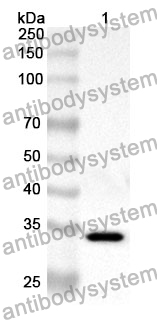Catalog No.
PHB89301
Species reactivity
Human
Host species
Rabbit
Isotype
IgG
Clonality
Polyclonal
Immunogen
E. coli - derived recombinant Human SPINK1 (Asp24-Cys79).
Tested applications
ELISA: 1:4000-1:8000, IHC: 1:50-1:100, WB: 1:1000-1:4000
Target
TATI,Serine protease inhibitor Kazal-type 1,PSTI,Pancreatic secretory trypsin inhibitor,Tumor-associated trypsin inhibitor,SPINK1
Purification
Purified by antigen affinity column.
Accession
P00995
Applications
ELISA, IHC, WB
Form
Liquid
Storage buffer
0.01M PBS, pH 7.4, 50% Glycerol, 0.05% Proclin 300.
Stability and Storage
Use a manual defrost freezer and avoid repeated freeze thaw cycles. Store at 2 to 8°C for frequent use. Store at -20 to -80°C for twelve months from the date of receipt.
SPINK1-induced tumor plasticity provides a therapeutic window for chemotherapy in hepatocellular carcinoma., PMID:38030644
Serine Protease Inhibitor Kazal Type 1, A Potential Biomarker for the Early Detection, Targeting, and Prediction of Response to Immune Checkpoint Blockade Therapies in Hepatocellular Carcinoma., PMID:35924241
The Clinical Utility of Soluble Serum Biomarkers in Autoimmune Pancreatitis: A Systematic Review., PMID:35884816
SPINK1 as a plasma marker for tumor hypoxia and a therapeutic target for radiosensitization., PMID:34747365
A mouse testis serine protease, TESP1, as the potential SPINK3 receptor protein on mouse sperm acrosome., PMID:34524424
Targeting an autocrine IL-6-SPINK1 signaling axis to suppress metastatic spread in ovarian clear cell carcinoma., PMID:32929152
Tumor-associated trypsin inhibitor (TATI) and tumor-associated trypsin-2 (TAT-2) predict outcomes in gastric cancer., PMID:32124669
PRSS contributes to cetuximab resistance in colorectal cancer., PMID:31911942
Pseudogene Associated Recurrent Gene Fusion in Prostate Cancer., PMID:31446281
Inflammation and pancreatic cancer: An updated review., PMID:30588953
Screening of biomarkers for liver adenoma in low-dose-rate γ-ray-irradiated mice., PMID:29424599
The Diagnostic Role of SPINK1 in Differentiating Hepatocellular Carcinoma From Nonmalignant Lesions., PMID:27028242
Biomarker development, from bench to bedside., PMID:26287282
Prostate adenocarcinomas aberrantly expressing p63 are molecularly distinct from usual-type prostatic adenocarcinomas., PMID:25216229
Novel RNA hybridization method for the in situ detection of ETV1, ETV4, and ETV5 gene fusions in prostate cancer., PMID:25203299
[New biomarkers in prostate cancer]., PMID:24246875
Pancreatic secretory trypsin inhibitor causes autocrine-mediated migration and invasion in bladder cancer and phosphorylates the EGF receptor, Akt2 and Akt3, and ERK1 and ERK2., PMID:23698120
The clinical picture of juvenile parotitis in a prospective setup., PMID:22924783
Validation and comparison of tumor-associated trypsin inhibitor (TATI) immunoassays., PMID:22507084
Role of the inflammatory protein serine protease inhibitor Kazal in preventing cytolytic granule granzyme A-mediated apoptosis., PMID:22043941
Combined genomic and phenotype screening reveals secretory factor SPINK1 as an invasion and survival factor associated with patient prognosis in breast cancer., PMID:21656687
Therapeutic targeting of SPINK1-positive prostate cancer., PMID:21368222
Interference with the 19S proteasomal regulatory complex subunit PSMD4 on the sperm surface inhibits sperm-zona pellucida penetration during porcine fertilization., PMID:20526895
Exclusive expression of a membrane-bound Spink3-interacting serine protease-like protein TESPL in mouse testis., PMID:20512923
Autoantibodies against the exocrine pancreas in autoimmune pancreatitis: gene and protein expression profiling and immunoassays identify pancreatic enzymes as a major target of the inflammatory process., PMID:20407433
Expression and localization of acrosin inhibitor in boar reproductive tract., PMID:19813026
Analysis of humoral immune response in experimental autoimmune pancreatitis in mice., PMID:19812526
Pancreatic secretory trypsin inhibitor is a major motogenic and protective factor in human breast milk., PMID:19147803
Concomitant autoimmune and genetic pancreatitis leads to severe inflammatory conditions., PMID:18442214
Inhibition of a novel sperm gelatinase in prawn sperm by the male reproduction-related Kazal-type peptidase inhibitor., PMID:18324674
Autocrine induction of invasion and metastasis by tumor-associated trypsin inhibitor in human colon cancer cells., PMID:18317448
Human pancreatic secretory trypsin inhibitor stabilizes intestinal mucosa against noxious agents., PMID:17982125
Epitope topology and removal of mouse acrosomal plasma membrane by P12-targeted immunoaggregation., PMID:16934746
Identification of a novel autoantibody against pancreatic secretory trypsin inhibitor in patients with autoimmune pancreatitis., PMID:16804408
Preoperative serum hCGbeta as a prognostic marker in primary fallopian tube carcinoma., PMID:16340249
Trypsin-2 degrades human type II collagen and is expressed and activated in mesenchymally transformed rheumatoid arthritis synovitis tissue., PMID:16192646
High tissue expression of tumour-associated trypsin inhibitor (TATI) associates with a more favourable prognosis in gastric cancer., PMID:15810949
Identification of genes up-regulated in urothelial tumors: the 67-kd laminin receptor and tumor-associated trypsin inhibitor., PMID:12875970
Functional analysis of Toxoplasma gondii protease inhibitor 1., PMID:12228242
[Usefulness of selected circulating biochemical markers in diagnosis and monitoring of endometriosis]., PMID:10390920
Monitor peptide (rat pancreatic secretory trypsin inhibitor) directly stimulates the proliferation of the nontransformed intestinal epithelial cell line, IEC-6., PMID:9693203
Characterization of engineered hepatitis C virus NS3 protease inhibitors affinity selected from human pancreatic secretory trypsin inhibitor and minibody repertoires., PMID:9311825
Distribution and expression of pancreatic secretory trypsin inhibitor and its possible role in epithelial restitution., PMID:8774127
Pancreatic secretory trypsin inhibitor in human Brunner's glands., PMID:7719422
Modeling of protein loops by simulated annealing., PMID:8401234
Optimization of a time-resolved immunofluorometric assay for tumor-associated trypsin inhibitor (TATI) using the streptavidin-biotin system., PMID:8486933
Quantification of pancreatic secretory trypsin inhibitor in colonic carcinoma and normal adjacent colonic mucosa., PMID:1479031
Evaluation of CEA, CA 19-9, CA-50, CA-195, and TATI with special reference to pancreatic disorders., PMID:1791319
Tumor-associated trypsin inhibitor in induced and acquired immunodeficiency. Studies on transplanted and HIV-infected patients., PMID:1780693
Tumor-associated trypsin inhibitor as a possible marker in male infertility., PMID:1780692


